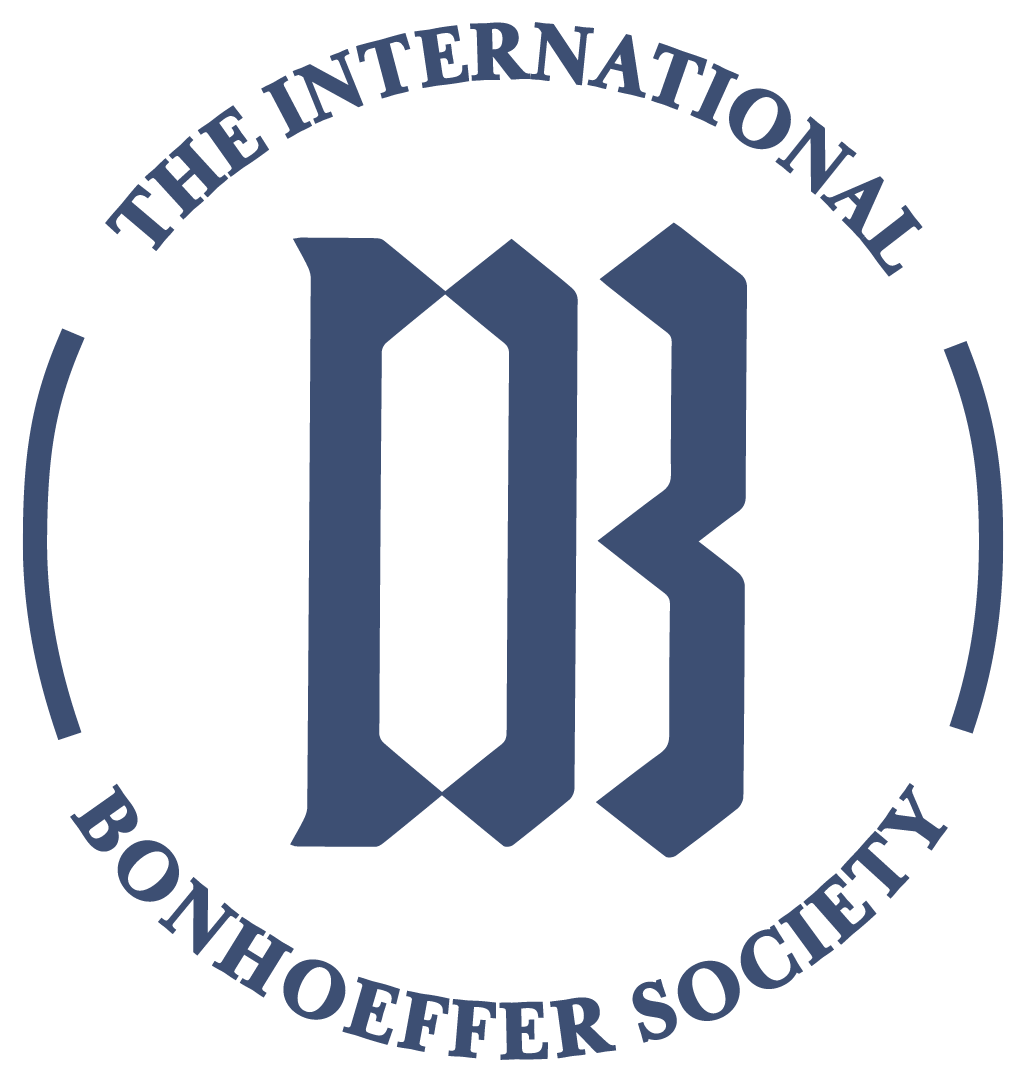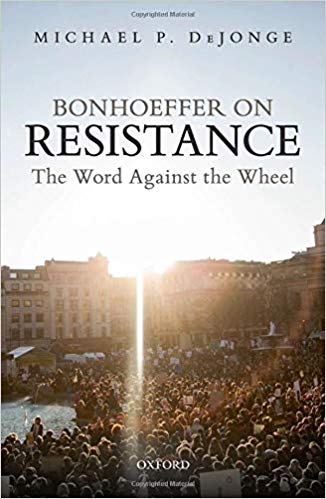Review of Michael P. DeJonge, Bonhoeffer on Resistance: The Word Against the Wheel. Oxford: Oxford University Press, 2018. $25.00. 192 pp.
While the temptation to hagiography has long been acknowledged in Bonhoeffer scholarship, the concomitant problem of historicism has been given less attention. The moving story of Bonhoeffer’s life leads interpreters to focus on the social and biographical context of his work. While that is something to be celebrated, at times it has meant that the content of Bonhoeffer’s writings is overshadowed by the moral power of his life.
Nowhere is this more evident than in Bonhoeffer’s understanding of political resistance. We continue to return to him for guidance because we recognize that he not only thought about political resistance but actually engaged in it. As Karl Barth wrote of Bonhoeffer in 1952, “Why should one not allow oneself to be addressed like this by a man of whom it was asked and to whom it was also given that he not only thought it and said it, but also lived it?”[1] Bonhoeffer is a moral exemplar, someone whose life suggests he possesses moral authority. What he says carries the weight of his sacrifice.
Still, Bonhoeffer’s conception of political resistance should not be reduced to a narrative of his life, to recounting the various forms of his own resistance. Without losing sight of biography, Michael DeJonge has helpfully refocused our attention on Bonhoeffer’s conceptual framework of political resistance, while showing how Bonhoeffer’s ideas were not merely epiphenomenal to his actions. In his recent book, Bonhoeffer on Resistance: The Word and the Wheel, DeJonge argues that much of Bonhoeffer’s highly complex and nuanced account of resistance was in place early in his career. Changing circumstances in Germany throughout the 1930s and 1940s led Bonhoeffer to engage various aspects of this multiform account. Rather than abandoning various forms of resistance on the road to his involvement in a conspiracy against Hitler, we find that Bonhoeffer maintained a pluriform understanding of resistance applicable to various political situations.
Working across the range of Bonhoeffer’s corpus, DeJonge highlights three phases in the development of Bonhoeffer’s understanding of resistance. During the first phase, Bonhoeffer emphasizes how the church resists through its proclamation of the Word. In the second phase, Bonhoeffer emphasizes how the church resists through its existence as community. This is the period of Finkenwalde, of Discipleship and Life Together. The third phase is marked by Bonhoeffer’s involvement in the conspiracy against Adolf Hitler. The three phases underline DeJonge’s careful attention to the agent of resistance in Bonhoeffer’s thought. In the first two phases, the agent of resistance is the church. In the third phase, the agent is the individual, rather than the church. DeJonge’s account pushes against readings of Bonhoeffer which elide this distinction, whether by attributing to non-ecclesial entities forms of resistance Bonhoeffer saw as distinctly ecclesial, or by attributing to the church forms of resistance Bonhoeffer saw as centering on the individual or on humanitarian organizations.
In addition to the three phases of Bonhoeffer’s resistance activity, DeJonge highlights six “types” of resistance in Bonhoeffer’s thought. Tacitly implied in Bonhoeffer’s 1933 essay, “The Church and the Jewish Question,” Type 1 involves the individual accusing the state of inhumanity, in cases where the state nevertheless continues to function as a legitimate state. The next three types (2-4) are discussed explicitly in the same essay. In Types 2-4, the agent of resistance is neither the individual nor a humanitarian organization but rather the church. Type 2 refers to the church’s diaconal work in serving the victims of state injustice. Type 3 is the church’s indirect political word, questioning whether the state’s actions are those of a legitimate state. Type 4 invokes the famous passage about “seizing the wheel” of the state, which has often been misconstrued as calling for physical resistance of some form. DeJonge argues on the contrary that for Bonhoeffer the church “seizes the wheel” by proclaiming a concrete commandment, under the auspices of an ecumenical council.
Arising during the second phase of Bonhoeffer’s thinking, in Type 5 the church resists not by intervening directly in the public sphere but rather by fostering an alternative community of discipleship. On this reading, Finkenwalde was no respite from political engagement, but was itself an important form of resistance, called for by the particular conditions of the time. Representing the third and final phase of Bonhoeffer’s resistance thinking, Type 6 refers to a “free responsible action” in which an individual does what is necessary to restore the forms of institutional life that make ethics possible, which Bonhoeffer’s describes as the divine mandates of church, state, family, and culture. This necessary action in a state of emergency might require extreme measures, such as the assassination attempt in which Bonhoeffer and his co-conspirators were embroiled. Bonhoeffer’s claim is not that under certain conditions the overthrow of a political leader is morally justified, but rather that such an act might become necessary and responsible while still entailing guilt.
A historian of ideas, DeJonge spotlights just how different Bonhoeffer’s way of thinking is from that of contemporary western democratic modes of thought, not least on the question of political resistance. If Stephen Haynes’s recent book The Battle for Bonhoeffer (Eerdmans 2018) shows how Bonhoeffer has been invoked in the United States on behalf of almost every political cause imaginable, DeJonge’s book brings into sharp relief just what it would mean to come to grips with Bonhoeffer’s conception of political resistance, and indeed of church and state more broadly. Here DeJonge builds on his previous work, in particular Bonhoeffer’s Reception of Luther (OUP 2016). A key takeaway from this new volume is that Bonhoeffer’s conception of resistance is inescapably Lutheran. DeJonge rejects the view that Bonhoeffer left behind his Lutheran assumptions on his way to political resistance. Bonhoeffer’s involvement in political resistance was, on the contrary, inextricable from his Lutheran political theology. DeJonge has made a significant contribution to Bonhoeffer scholarship in bringing this point to light, and in such a convincing and compelling way.
About the Reviewer(s): Joshua Mauldin is Associate Director of the Center of Theological Inquiry in Princeton, New Jersey. He holds a PhD in religious ethics from Southern Methodist University, and his research interests include the ethics of Barth and Bonhoeffer, law and religion, and Christianity in China. He can be reached by email at [email protected] and @joshuatmauldin on Twitter.
About the Author: Michael P. DeJonge is Associate Professor of Religious Studies at the University of South Florida, where he teaches on the history of Christian theology and topics in modern religious thought. His previous publications include Bonhoeffer’s Reception of Luther (2017), Bonhoeffer’s Theological Formation (2012), and The Bonhoeffer Reader (co-edited with Clifford J. Green; 2014).
You can purchase Bonhoeffer on Resistance: The Word Against the Wheel at the following link: https://global.oup.com/academic/product/bonhoeffer-on-resistance-9780198824176?cc=us&lang=en&
[1] Karl Barth, “Letter to Landessuperintendent P.W. Herrenbrück, 21 December 1952,” in Ronald Gregor Smith, Editor, World Come of Age (Philadelphia: Fortress Press, 1967), 91.

